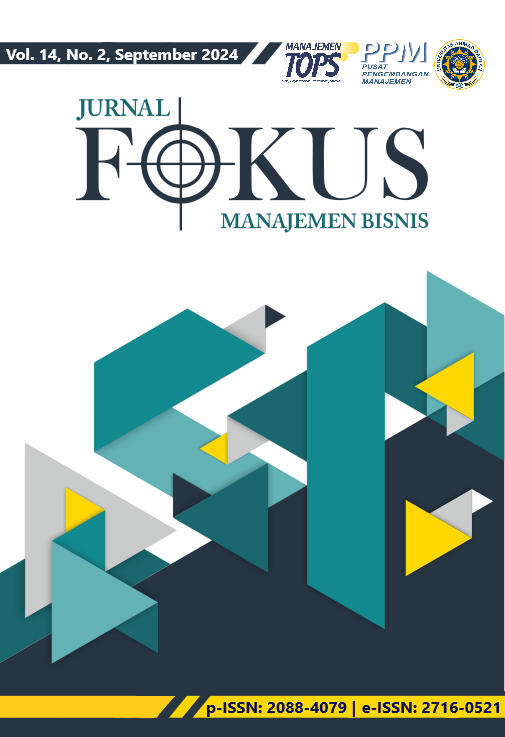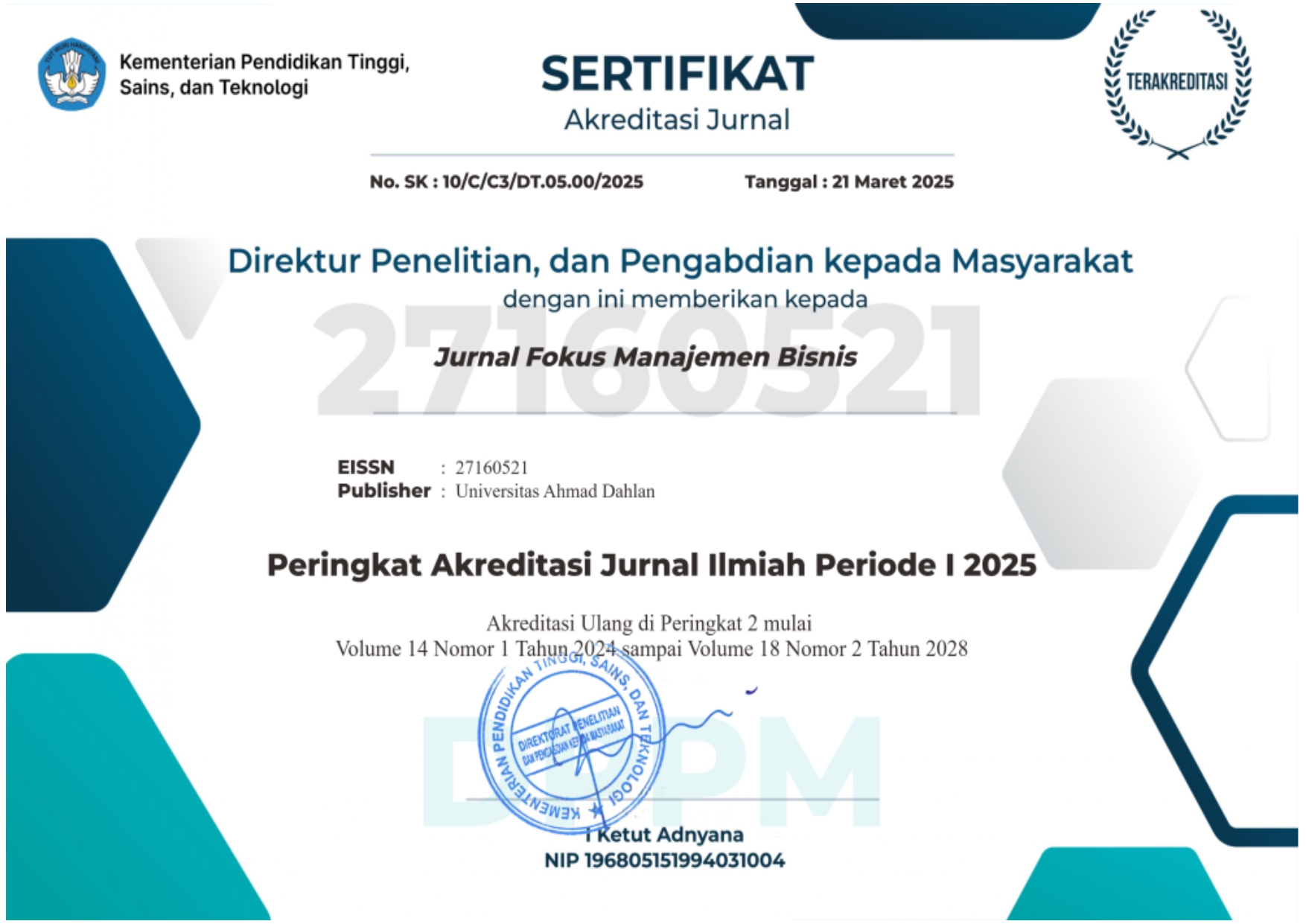Exploring the effect of guest experience on guest loyalty: Mediating role of guest satisfaction
DOI:
https://doi.org/10.12928/fokus.v14i2.10526Abstract
Indonesia is known as an archipelago of islands with a wide variety of cultures and natural beauty, providing many options for tourists to visit. This research aims to investigate the influence of guest experiences on guest loyalty within the accommodation sector, focusing on Indonesian Generation Z. The study employs a quantitative method, utilizing an online survey distributed through Google Forms, to gather data from 146 valid respondents who had stayed in Indonesian accommodations within a year. The data was processed using partial least squares structural equation modeling with Smart PLS 3.2.9. The results reveal that guest experiences in pre-trip, on-trip, and post-trip directly influence guest satisfaction. Guest satisfaction significantly influences guest loyalty. Moreover, guest loyalty is indirectly influenced by guest experiences (in pre-trip, on-trip, and post-trip) that are mediated by guest satisfaction. Guest experiences in pre-trip, on-trip, and post-trip have no direct influence towards guest loyalty. These findings highlight the importance of providing excellent services and products before, during, and after the trip to increase guest loyalty through guest satisfaction. The results contribute to the development of effective strategies for enhancing guest loyalty and satisfaction, ultimately benefiting accommodation providers and the broader hospitality industry.
References
Abd-Elaziz, M. E., Aziz, W. M., Khalifa, G. S., & Abdel-Aleem, M. (2015). Determinants of electronic word of mouth (EWOM) influence on hotel customers’ purchasing decision. Journal of Faculty of Tourism and Hotels, Fayoum University, 9(2).
Adzoyi, P. N., Blomme, R. J., & Honyenuga, B. Q. (2018). Customer retention among hotels in an emerging market: An employee-based perspective. Advances in Hospitality and Leisure, 14. https://doi.org/10.1108/S1745-354220180000014004
Afifah, A., & Kurniawati, N. A. (2021). Influence of service quality dimensions of Islamic Banks on customer satisfaction and their impact on customer loyalty. Journal of Islamic Economic Laws, 4(2). https://doi.org/10.23917/jisel.v4i2.15089
Akhoondnejad, A. (2015). Analyzing the pre-travel, on-travel, and post-travel behaviors of Iran’s first-time visitors. Journal of Travel and Tourism Marketing, 32(8). https://doi.org/10.1080/10548408.2014.957796
Alauddin, M., Ahsan, S. M. H., Mowla, M. M., Islam, M. M., & Hossain, M. H. (2019). Investigating the relationship between service quality, customer satisfaction and customer loyalty in hotel industry: Bangladesh perspective. Global Journal of Management and Business Research, 19(1).
Ali, F., Kim, W. G., Li, J., & Jeon, H. M. (2018). Make it delightful: Customers’ experience, satisfaction and loyalty in Malaysian theme parks. Journal of Destination Marketing and Management, 7. https://doi.org/10.1016/j.jdmm.2016.05.003
Andajani, E. (2015). Understanding customer experience management in retailing. Procedia - Social and Behavioral Sciences, 211. https://doi.org/10.1016/j.sbspro.2015.11.082
Ariffin, S., Yusof, J. M., Putit, L., & Shah, M. I. A. (2016). Factors influencing perceived quality and repurchase intention towards green products. Procedia Economics and Finance, 37. https://doi.org/10.1016/s2212-5671(16)30142-3
Asakdiyah, S., Bonaga, J. K., Maheswari, U., Prastowo, I., & Salampessy, A. P. (2024). The mediating role of customer loyalty on the effect of celebrity endorsement to impulse buying behavior. Jurnal Fokus Manajemen Bisnis, 14(1), 124–135. https://doi.org/10.12928/fokus.v14i1.10228
Avgeli, V., Smarianakis, D., & Sotiriades, M. (2020). Correlating customer satisfaction and customer loyalty: The case of international tourists in Cretan Resort Hotels. J. of Tourism and Hospitality Management, 8(2). https://doi.org/10.17265/2328-2169/2020.02.001
Battour, M., Rahman, M. K., & Rana, M. S. (2020). The impact of PHTPS on trip quality, trip value, satisfaction and word of mouth: Non-Muslim tourists’ perspective. Journal of Islamic Marketing, 11(6). https://doi.org/10.1108/JIMA-03-2019-0058
Briandana, R., & Dwityas, N. A. (2017). Social media in travel decision making process. International Journal of Humanities and Social Sciences, 7(7).
Chi, C. G. Q., & Qu, H. (2008). Examining the structural relationships of destination image, tourist satisfaction and destination loyalty: An integrated approach. Tourism Management, 29(4). https://doi.org/10.1016/j.tourman.2007.06.007
Choe, Y., Kim, J. (Jamie), & Fesenmaier, D. R. (2017). Use of social media across the trip experience: An application of latent transition analysis. Journal of Travel and Tourism Marketing, 34(4). https://doi.org/10.1080/10548408.2016.1182459
Darini, M., & Khozaei, F. (2016). The study of factors affecting customer’s satisfaction with the three star hotels in Dubai. International Journal of Advanced Engineering, Management and Science (IJAEMS), 2(2).
Dimock, M. (2018). Defining generations: Where millennials end and post-millennials begin. Pew Research Center.
Edgar, T. W., & Manz, D. O. (2017). Research methods for cyber security. Syngress.
Garson, D. (2016). Partial least squares: Regression and structural equation model. Statistical Publishing Associates.
Gogoi, B. J. (2020). Service quality measures: How it impacts customer satisfaction and loyalty. International Journal of Management, 11(3). https://doi.org/10.34218/IJM.11.3.2020.038
Griffin, J. (2016). Customer Loyalty: Menumbuhkan, dan mempertahankan kesetiaan pelanggan. Alih Bahasa Dwi Kartini Yahya. MIT Press Books.
Hair, J. F., Sarstedt, M., Hopkins, L., & Kuppelwieser, V. G. (2014). Partial least squares structural equation modeling (PLS-SEM): An emerging tool in business research. European Business Review, 26(2). https://doi.org/10.1108/EBR-10-2013-0128
Hasfar, M., Theresia, M., & Norlitaria, A. G. (2020). Effect of customer value and customer experience on customer satisfaction and loyalty PT Meratus Samarinda. International Journal of Economics, Business and Accounting Research (IJEBAR), 4(01). https://doi.org/10.29040/ijebar.v4i01.909
Ho, C. I., Lin, Y. C., Yuan, Y. L., & Chen, M. C. (2016). Pre-trip tourism information search by smartphones and use of alternative information channels: A conceptual model. Cogent Social Sciences, 2(1). https://doi.org/10.1080/23311886.2015.1136100
Ifelunni, C. O., Ede, M. O., & Okeke, C. I. (2022). Rational emotive intervention for work-family conflict and female primary school teachers’ well-being. Current Psychology. https://doi.org/10.1007/s12144-022-03704-9
Joshi, A., Kale, S., Chandel, S., & Pal, D. (2015). Likert scale: Explored and explained. British Journal of Applied Science & Technology, 7(4). https://doi.org/10.9734/bjast/2015/14975
Jung, D., & Cho, M. H. (2015). A discovery of the positive travel experience in pre-trip, on-site and post-trip stage. https://scholarworks.umass.edu/entities/publication/564895a0-3164-4b40-9737-c3b8689cf605
Kaura, V., Prasad, C. S. D., & Sharma, S. (2015). Service quality, service convenience, price and fairness, customer loyalty, and the mediating role of customer satisfaction. International Journal of Bank Marketing, 33(4). https://doi.org/10.1108/IJBM-04-2014-0048
Latiff, K., & Ng, S. I. (2015). The impact of tourism service quality on satisfaction. International Journal of Economics and Management, 9(S).
Lemon, K. N., & Verhoef, P. C. (2016). Understanding customer experience throughout the customer journey. Journal of Marketing, 80(6). https://doi.org/10.1509/jm.15.0420
Mun, S. G., Park, E. O., & Woo, L. (2022). Strategic target customers of food and beverage offerings in full-service hotels: Outside-hotel customers. International Journal of Hospitality Management, 102. https://doi.org/10.1016/j.ijhm.2022.103159
Myo, Y. N., Khalifa, G. S. A., & Aye, T. T. (2019). The impact of service quality on customer loyalty of myanmar hospitality industry: The mediating role of customer satisfaction. International Journal of Management and Human Science (IJMHS), 3(3).
Nobar, H. B. K., & Rostamzadeh, R. (2018). The impact of customer satisfaction, customer experience and customer loyalty on brand power: Empirical evidence from hotel industry. Journal of Business Economics and Management, 19(2). https://doi.org/10.3846/jbem.2018.5678
Nusair, K. K., Bilgihan, A., Okumus, F., & Cobanoglu, C. (2013). Generation Y travelers’ commitment to online social network websites. Tourism Management, 35. https://doi.org/10.1016/j.tourman.2012.05.005
Pekovic, S., & Rolland, S. (2020). Recipes for achieving customer loyalty: A qualitative comparative analysis of the dimensions of customer experience. Journal of Retailing and Consumer Services, 56. https://doi.org/10.1016/j.jretconser.2020.102171
Rahmiati, F., Ismail, Y., Amin, G., Simatupang, T., Larso, D., & Othman, N. A. (2019). Tourism value chain activities model for competitive advantage measurement. International Conference on Trade 2019 (ICOT 2019) (pp. 43-47). Atlantis Press.
Ramesh, V., & Jaunky, V. C. (2020). The tourist experience: Modelling the relationship between tourist satisfaction and destination loyalty. Materials Today: Proceedings, 37(2). https://doi.org/10.1016/j.matpr.2020.07.723
Rane, N. L., Achari, A., & Choudhary, S. P. (2023). Enhancing customer loyalty through quality of service: Effective strategies to improve customer satisfaction, experience, relationship, and engagement. International Research Journal of Modernization in Engineering Technology and Science, 5(5), 427–452. https://doi.org/10.56726/IRJMETS38104
Rasoolimanesh, S. M., Seyfi, S., Hall, C. M., & Hatamifar, P. (2021). Understanding memorable tourism experiences and behavioural intentions of heritage tourists. Journal of Destination Marketing and Management, 21. https://doi.org/10.1016/j.jdmm.2021.100621
Rejeb, A., & Keogh, J. G. (2021). 5G networks in the value chain. Wireless Personal Communications, 117(2). https://doi.org/10.1007/s11277-020-07936-5
Roy, S. K., Shekhar, V., Lassar, W. M., & Chen, T. (2018). Customer engagement behaviors: The role of service convenience, fairness and quality. Journal of Retailing and Consumer Services, 44. https://doi.org/10.1016/j.jretconser.2018.07.018
Sharples, L. (2019). Research note: Customer experience management in cruise pre-consumption. International Journal of Culture, Tourism, and Hospitality Research, 13(2). https://doi.org/10.1108/IJCTHR-02-2019-0023
Skripak, S. J. (2023). Fundamentals of business: Third edition. VA: VT Publishing.
Sukardi, S., Jahid, M. A., & Hendrawan, S. (2023). E-service quality and promotion on customer loyalty: The importance of customer satisfaction. Jurnal Fokus Manajemen Bisnis, 13(2). https://doi.org/10.12928/fokus.v13i2.9130
Torabi, Z. A., Shalbafian, A. A., Allam, Z., Ghaderi, Z., Murgante, B., & Khavarian-Garmsir, A. R. (2022). Enhancing memorable experiences, tourist satisfaction, and revisit intention through smart tourism technologies. Sustainability (Switzerland), 14(5). https://doi.org/10.3390/su14052721
Trung, N. V. H., & Khalifa, G. S. A. (2019). Impact of destination image factors on revisit intentions of hotel international tourists in Ba Ria-Vung Tau (Br-Vt) the mediating role of positive word of mouth. International Journal on Recent Trends in Business and Tourism (IJRTBT), 3(2).
Tuan, V. K., & Rajagopal, P. (2017). The mediating effect of perceived quality on the customer loyalty in small and medium-sized enterprises (SMEs) in the mobile phone sector in Ho Chi Minh City (HCMC)-Vietnam. International Journal of New Technology and Research, 3(11), 129–137.
Veloso, M., & Gomez-Suarez, M. (2023). Customer experience in the hotel industry: A systematic literature review and research agenda. International Journal of Contemporary Hospitality Management, 35(8). https://doi.org/10.1108/IJCHM-04-2022-0517
Walls, A., Okumus, F., Wang, Y., & Kwun, D. J. W. (2011). Understanding the consumer experience: An exploratory study of luxury hotels. Journal of Hospitality Marketing and Management, 20(2). https://doi.org/10.1080/19368623.2011.536074
Weng, M. (2016). Study on the influencing factors of hotel customer satisfaction. 2016 International Conference on Computer and Information Technology Applications (pp. 121-125). Atlantis Press.
Wu, W. Y., Qomariyah, A., Sa, N. T. T., & Liao, Y. (2018). The Integration between service value and service recovery in the hospitality industry: An application of QFD and ANP. International Journal of Hospitality Management, 75. https://doi.org/10.1016/j.ijhm.2018.03.010
Xiang, Z., Schwartz, Z., Gerdes, J. H., & Uysal, M. (2015). What can big data and text analytics tell us about hotel guest experience and satisfaction? International Journal of Hospitality Management, 44. https://doi.org/10.1016/j.ijhm.2014.10.013
Yongchaitrakool, S. (2014). The effect of customer expectation, customer experience and customer price perception on customer satisfaction in hotel industry. International Conference on Management Science, Innovation, and Technology, Faculty of Management Science.
Zarezadeh, Z. Z., Rastegar, R., & Xiang, Z. (2022). Big data analytics and hotel guest experience: A critical analysis of the literature. International Journal of Contemporary Hospitality Management, 34(6). https://doi.org/10.1108/IJCHM-10-2021-1293
Downloads
Published
How to Cite
Issue
Section
License
Copyright (c) 2024 Filda Rahmiati, Putu Gede Lila Gargamunih Dewi, Norfaridatul Akmaliah Othman, Ketwadee Madden, Geraldine B. Advincula

This work is licensed under a Creative Commons Attribution-ShareAlike 4.0 International License.
Authors who publish with this journal agree to the following terms:Â
- Authors retain copyright and grant the journal right of first publication with the work simultaneously licensed under a Creative Commons Attribution License that allows others to share the work with an acknowledgment of the work's authorship and initial publication in this journal.
- Authors are able to enter into separate, additional contractual arrangements for the non-exclusive distribution of the journal's published version of the work (e.g., post it to an institutional repository or publish it in a book), with an acknowledgment of its initial publication in this journal.
- Authors are permitted and encouraged to post their work online (e.g., in institutional repositories or on their website) prior to and during the submission process, as it can lead to productive exchanges, as well as earlier and greater citation of published work (See The Effect of Open Access).







